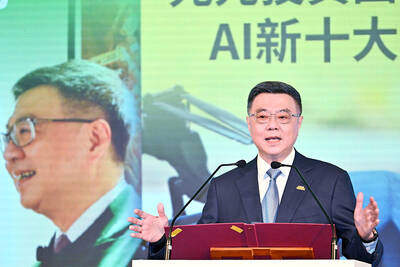Candidates vying to represent Kaohsiung in the nation's legislature are banking on grass-roots support and their history of service to the public to win office.
"All politics is local," as the popular saying goes.
Nowhere is that more true than in Kaohsiung.
"My family tree is deeply rooted in the city," said KMT hopeful Chiang Yi-wen (
Like Chiang, the KMT's Yao Kao-chiao (
"Having headed the city's police department for five years, I have helped improve the city's security and many locals have thanked me for my efforts," Yao said.
But political watchers say Yao may face challenges and opposition, as much of Kaohsiung's sex industry is located in his constituency.
In addition, the Taiwan Solidarity Union's (TSU) Lo Chi-ming (
The KMT's Tseng Chang-fa (
Compared to the KMT, the DPP has less trouble emphasizing its grass-roots appeal -- making elections in Kaohsiung an easy race for DPP candidates.
Take for example Chu Hsin-yu (
"There are just some `strange' types of groups who will vote for him. That's good enough to get him elected though his poll figures are always low," a DPP official said.
And even though DPP contender Kuo Wen-cheng (郭玟成) has refused to talk to the media, he still enjoys support from voters.
Serving your constituency rather than basking in the public limelight is the most effective way to secure votes, the DPP official said.
One likely winner in Kaohsiung is up-and-coming DPP politician Chen Chi-mai (陳其邁), the son of Chen Che-nan (陳哲男), the deputy secretary-general to the president.
Political observers say Chen, who won 98,553 votes three years ago, might be able to help other DPP candidates get elected.
Liao Da-chi (
Liao estimates that roughly 40,000 votes are enough to get elected this year.
Newcomer and doctor Lin Chin-hsin (林進興), who will be running on a DPP ticket, faces a tough battle but believes his record of providing free medical services to the poor will help him win votes.
Of Kaohsiung's 36 candidates, the New Party's Hsieh Chi-ta (謝啟大) and People First Party's Chiu Yi (邱毅) are the two that lack local connections.
"To the advantage of both, they are famous nationally," said Wang Chi-tsong (王啟聰), director of the PFP's Kaohsiung headquarters.
Wang said he hoped campaign rallies featuring Chairman James Soong (宋楚瑜) will help drum up support for the PFP.
Soong garnered 300 million votes in the city during last year's presidential election.
The party's campaign message is that a vote for a PFP candidate is a vote for Soong.
The PFP's campaign slogan is "Giving Soong a hand again."
Election prospects for the 16 independent candidates running in Kaohsiung are expected to be slim.
During the last legislative election, 81,083 votes came from non-partisan supporters, who mostly voted for Lin Hong-tsung.
Lin has now joined ranks with the KMT, and observers say that he is likely to siphon off votes from independent candidates.

Two US House of Representatives committees yesterday condemned China’s attempt to orchestrate a crash involving Vice President Hsiao Bi-khim’s (蕭美琴) car when she visited the Czech Republic last year as vice president-elect. Czech local media in March last year reported that a Chinese diplomat had run a red light while following Hsiao’s car from the airport, and Czech intelligence last week told local media that Chinese diplomats and agents had also planned to stage a demonstrative car collision. Hsiao on Saturday shared a Reuters news report on the incident through her account on social media platform X and wrote: “I

SHIFT PRIORITIES: The US should first help Taiwan respond to actions China is already taking, instead of focusing too heavily on deterring a large-scale invasion, an expert said US Air Force leaders on Thursday voiced concerns about the Chinese People’s Liberation Army’s (PLA) missile capabilities and its development of a “kill web,” and said that the US Department of Defense’s budget request for next year prioritizes bolstering defenses in the Indo-Pacific region due to the increasing threat posed by China. US experts said that a full-scale Chinese invasion of Taiwan is risky and unlikely, with Beijing more likely to pursue coercive tactics such as political warfare or blockades to achieve its goals. Senior air force and US Space Force leaders, including US Secretary of the Air Force Troy Meink and

‘BUILDING PARTNERSHIPS’: The US military’s aim is to continue to make any potential Chinese invasion more difficult than it already is, US General Ronald Clark said The likelihood of China invading Taiwan without contest is “very, very small” because the Taiwan Strait is under constant surveillance by multiple countries, a US general has said. General Ronald Clark, commanding officer of US Army Pacific (USARPAC), the US Army’s largest service component command, made the remarks during a dialogue hosted on Friday by Washington-based think tank the Center for Strategic and International Studies. Asked by the event host what the Chinese military has learned from its US counterpart over the years, Clark said that the first lesson is that the skill and will of US service members are “unmatched.” The second

STILL ON THE TABLE: The government is not precluding advanced nuclear power generation if it is proven safer and the nuclear waste issue is solved, the premier said Taiwan is willing to be in step with the world by considering new methods of nuclear energy generation and to discuss alternative approaches to provide more stable power generation and help support industries, Premier Cho Jung-tai (卓榮泰) said yesterday. The government would continue to develop diverse and green energy solutions, which include considering advances in nuclear energy generation, he added. Cho’s remarks echoed President William Lai’s (賴清德) comments in an interview last month, saying the government is not precluding “advanced and newer nuclear power generation” if it is proven to be safer and the issue of nuclear waste is resolved. Lai’s comment had